Analysis of Khan v. Minister for Immigration: Migration Law Case
VerifiedAdded on 2023/06/06
|6
|1153
|261
Case Study
AI Summary
This case study analyzes the case of Khan v. Minister for Immigration & Anor, focusing on a subclass 485 skilled visa application. The tribunal denied the visa due to the applicant's failure to provide skill assessment evidence, despite factors outside their control. The court upheld the decision, citing the applicant's non-compliance with Migration Regulations, specifically reg.485.2 and 485.223 of the Migration Regulations 1994 (Cth). The analysis highlights the importance of meeting all visa requirements and the limitations of the court's power to make exceptions. The case study also addresses the role of Migration Agents, referencing the Code of Conduct under schedule 2 to the Migration regulations 1998 (Cth), and discusses the potential breaches of the code by an agent in a similar situation. The document emphasizes the importance of providing accurate advice and acting in the client's best interest, highlighting the agent's responsibility to demonstrate sound knowledge of migration law and legislation.
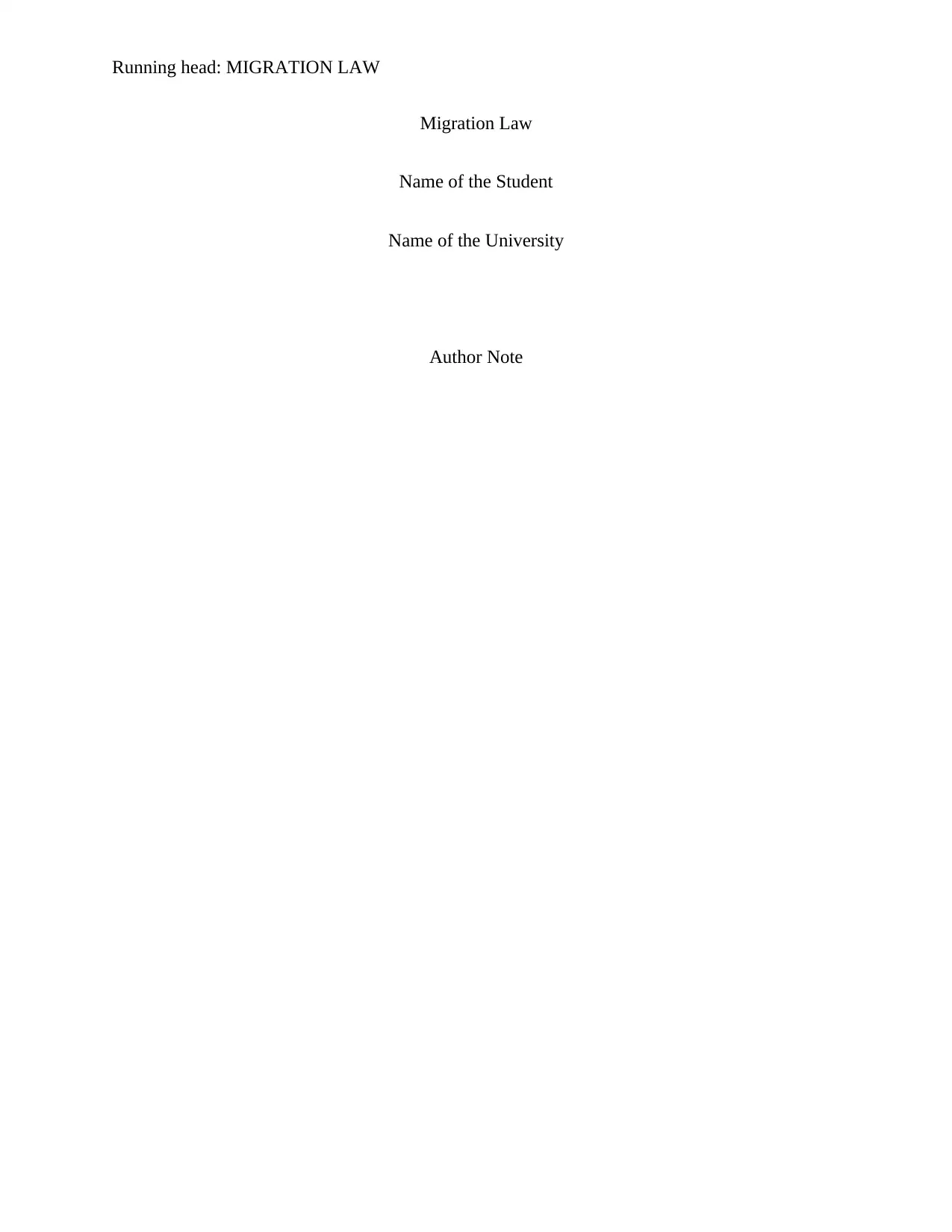
Running head: MIGRATION LAW
Migration Law
Name of the Student
Name of the University
Author Note
Migration Law
Name of the Student
Name of the University
Author Note
Paraphrase This Document
Need a fresh take? Get an instant paraphrase of this document with our AI Paraphraser
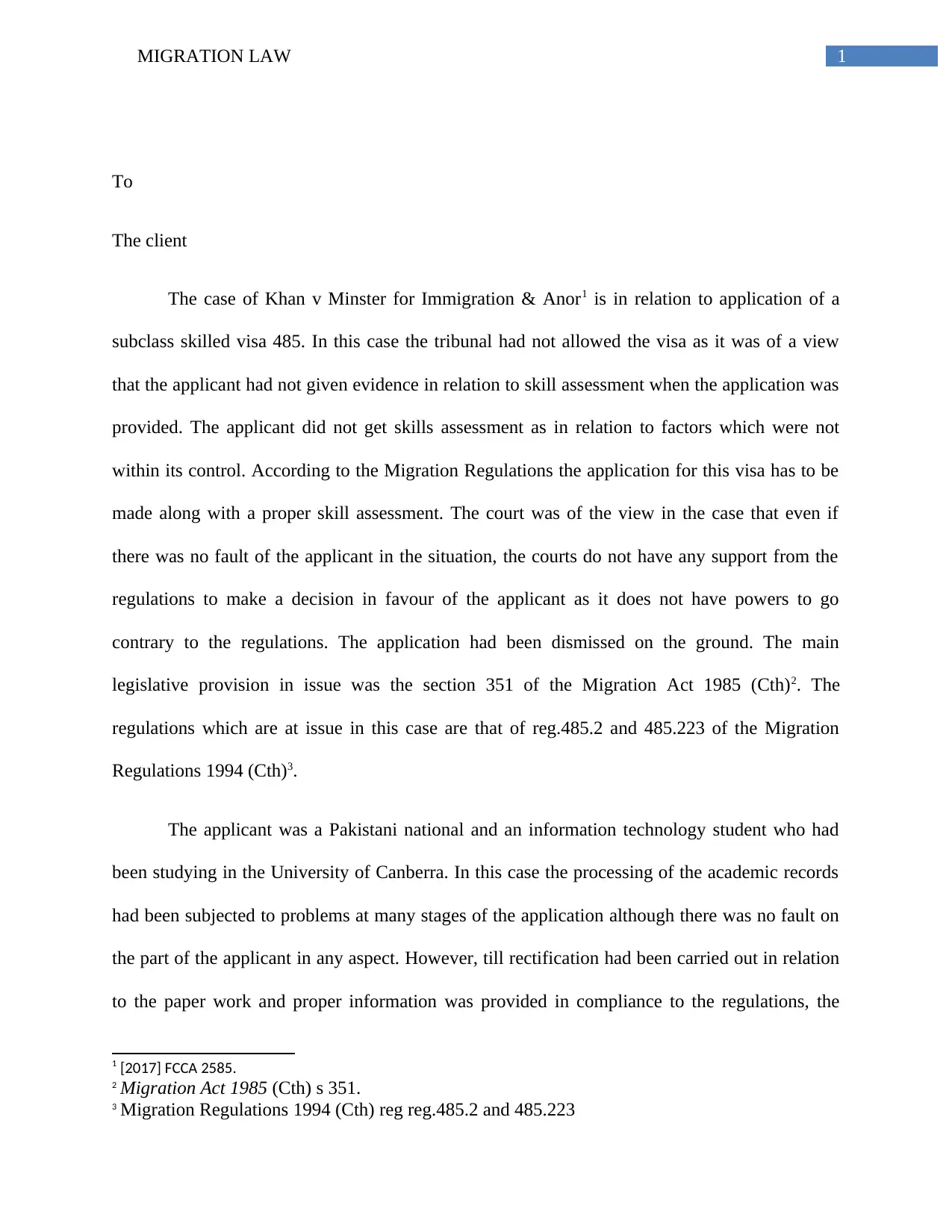
1MIGRATION LAW
To
The client
The case of Khan v Minster for Immigration & Anor1 is in relation to application of a
subclass skilled visa 485. In this case the tribunal had not allowed the visa as it was of a view
that the applicant had not given evidence in relation to skill assessment when the application was
provided. The applicant did not get skills assessment as in relation to factors which were not
within its control. According to the Migration Regulations the application for this visa has to be
made along with a proper skill assessment. The court was of the view in the case that even if
there was no fault of the applicant in the situation, the courts do not have any support from the
regulations to make a decision in favour of the applicant as it does not have powers to go
contrary to the regulations. The application had been dismissed on the ground. The main
legislative provision in issue was the section 351 of the Migration Act 1985 (Cth)2. The
regulations which are at issue in this case are that of reg.485.2 and 485.223 of the Migration
Regulations 1994 (Cth)3.
The applicant was a Pakistani national and an information technology student who had
been studying in the University of Canberra. In this case the processing of the academic records
had been subjected to problems at many stages of the application although there was no fault on
the part of the applicant in any aspect. However, till rectification had been carried out in relation
to the paper work and proper information was provided in compliance to the regulations, the
1 CCA[2017] F 2585.
2 Migration Act 1985 (Cth) s 351.
3 Migration Regulations 1994 (Cth) reg reg.485.2 and 485.223
To
The client
The case of Khan v Minster for Immigration & Anor1 is in relation to application of a
subclass skilled visa 485. In this case the tribunal had not allowed the visa as it was of a view
that the applicant had not given evidence in relation to skill assessment when the application was
provided. The applicant did not get skills assessment as in relation to factors which were not
within its control. According to the Migration Regulations the application for this visa has to be
made along with a proper skill assessment. The court was of the view in the case that even if
there was no fault of the applicant in the situation, the courts do not have any support from the
regulations to make a decision in favour of the applicant as it does not have powers to go
contrary to the regulations. The application had been dismissed on the ground. The main
legislative provision in issue was the section 351 of the Migration Act 1985 (Cth)2. The
regulations which are at issue in this case are that of reg.485.2 and 485.223 of the Migration
Regulations 1994 (Cth)3.
The applicant was a Pakistani national and an information technology student who had
been studying in the University of Canberra. In this case the processing of the academic records
had been subjected to problems at many stages of the application although there was no fault on
the part of the applicant in any aspect. However, till rectification had been carried out in relation
to the paper work and proper information was provided in compliance to the regulations, the
1 CCA[2017] F 2585.
2 Migration Act 1985 (Cth) s 351.
3 Migration Regulations 1994 (Cth) reg reg.485.2 and 485.223
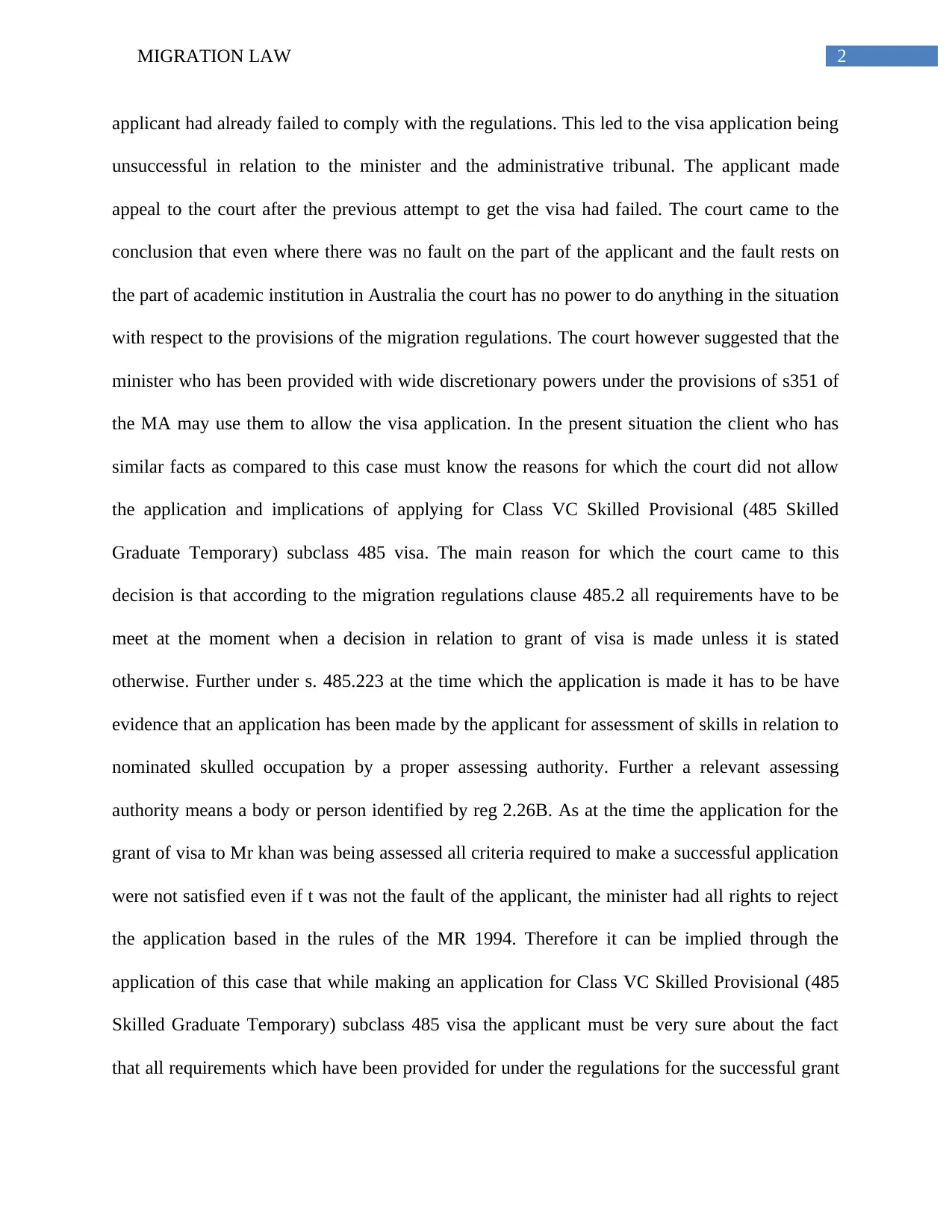
2MIGRATION LAW
applicant had already failed to comply with the regulations. This led to the visa application being
unsuccessful in relation to the minister and the administrative tribunal. The applicant made
appeal to the court after the previous attempt to get the visa had failed. The court came to the
conclusion that even where there was no fault on the part of the applicant and the fault rests on
the part of academic institution in Australia the court has no power to do anything in the situation
with respect to the provisions of the migration regulations. The court however suggested that the
minister who has been provided with wide discretionary powers under the provisions of s351 of
the MA may use them to allow the visa application. In the present situation the client who has
similar facts as compared to this case must know the reasons for which the court did not allow
the application and implications of applying for Class VC Skilled Provisional (485 Skilled
Graduate Temporary) subclass 485 visa. The main reason for which the court came to this
decision is that according to the migration regulations clause 485.2 all requirements have to be
meet at the moment when a decision in relation to grant of visa is made unless it is stated
otherwise. Further under s. 485.223 at the time which the application is made it has to be have
evidence that an application has been made by the applicant for assessment of skills in relation to
nominated skulled occupation by a proper assessing authority. Further a relevant assessing
authority means a body or person identified by reg 2.26B. As at the time the application for the
grant of visa to Mr khan was being assessed all criteria required to make a successful application
were not satisfied even if t was not the fault of the applicant, the minister had all rights to reject
the application based in the rules of the MR 1994. Therefore it can be implied through the
application of this case that while making an application for Class VC Skilled Provisional (485
Skilled Graduate Temporary) subclass 485 visa the applicant must be very sure about the fact
that all requirements which have been provided for under the regulations for the successful grant
applicant had already failed to comply with the regulations. This led to the visa application being
unsuccessful in relation to the minister and the administrative tribunal. The applicant made
appeal to the court after the previous attempt to get the visa had failed. The court came to the
conclusion that even where there was no fault on the part of the applicant and the fault rests on
the part of academic institution in Australia the court has no power to do anything in the situation
with respect to the provisions of the migration regulations. The court however suggested that the
minister who has been provided with wide discretionary powers under the provisions of s351 of
the MA may use them to allow the visa application. In the present situation the client who has
similar facts as compared to this case must know the reasons for which the court did not allow
the application and implications of applying for Class VC Skilled Provisional (485 Skilled
Graduate Temporary) subclass 485 visa. The main reason for which the court came to this
decision is that according to the migration regulations clause 485.2 all requirements have to be
meet at the moment when a decision in relation to grant of visa is made unless it is stated
otherwise. Further under s. 485.223 at the time which the application is made it has to be have
evidence that an application has been made by the applicant for assessment of skills in relation to
nominated skulled occupation by a proper assessing authority. Further a relevant assessing
authority means a body or person identified by reg 2.26B. As at the time the application for the
grant of visa to Mr khan was being assessed all criteria required to make a successful application
were not satisfied even if t was not the fault of the applicant, the minister had all rights to reject
the application based in the rules of the MR 1994. Therefore it can be implied through the
application of this case that while making an application for Class VC Skilled Provisional (485
Skilled Graduate Temporary) subclass 485 visa the applicant must be very sure about the fact
that all requirements which have been provided for under the regulations for the successful grant
⊘ This is a preview!⊘
Do you want full access?
Subscribe today to unlock all pages.

Trusted by 1+ million students worldwide
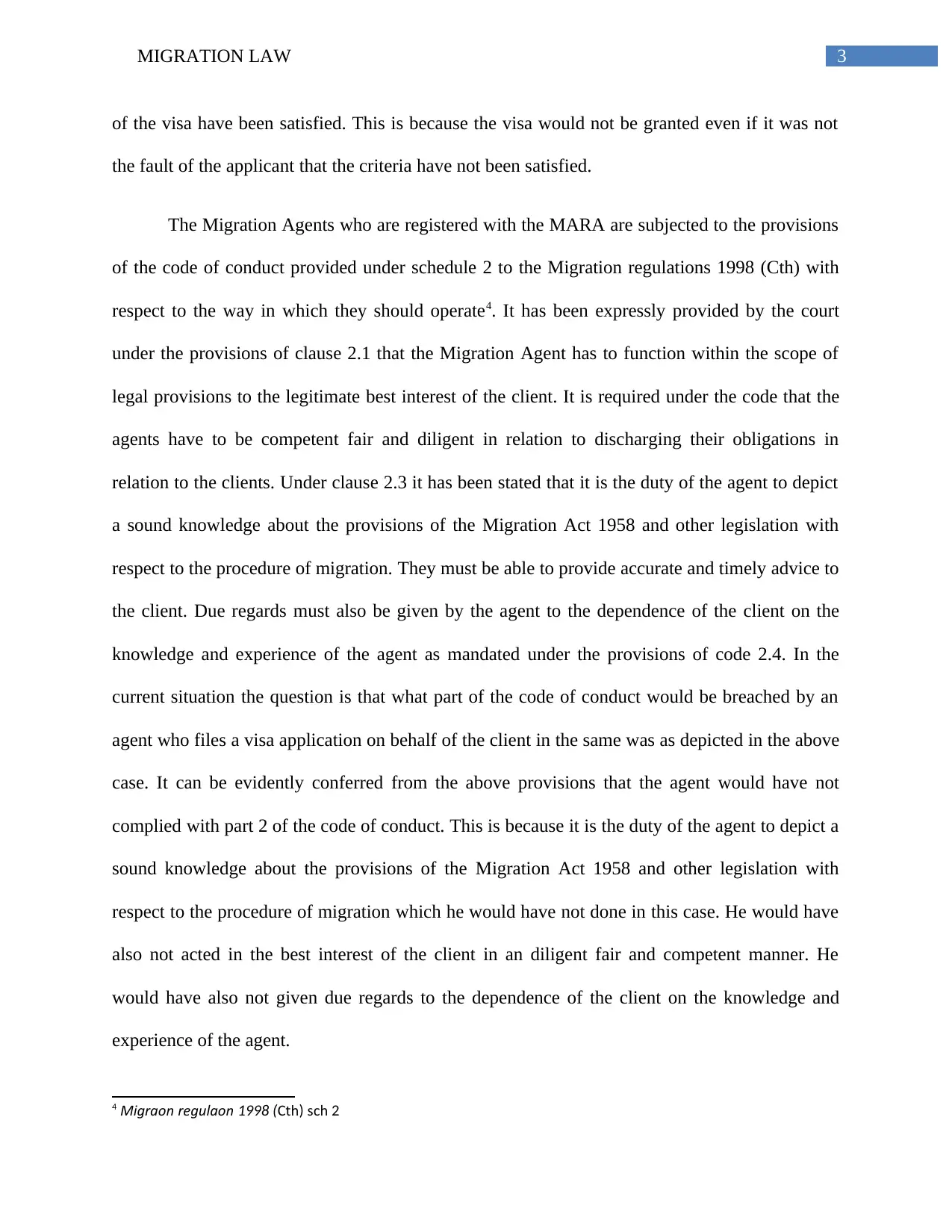
3MIGRATION LAW
of the visa have been satisfied. This is because the visa would not be granted even if it was not
the fault of the applicant that the criteria have not been satisfied.
The Migration Agents who are registered with the MARA are subjected to the provisions
of the code of conduct provided under schedule 2 to the Migration regulations 1998 (Cth) with
respect to the way in which they should operate4. It has been expressly provided by the court
under the provisions of clause 2.1 that the Migration Agent has to function within the scope of
legal provisions to the legitimate best interest of the client. It is required under the code that the
agents have to be competent fair and diligent in relation to discharging their obligations in
relation to the clients. Under clause 2.3 it has been stated that it is the duty of the agent to depict
a sound knowledge about the provisions of the Migration Act 1958 and other legislation with
respect to the procedure of migration. They must be able to provide accurate and timely advice to
the client. Due regards must also be given by the agent to the dependence of the client on the
knowledge and experience of the agent as mandated under the provisions of code 2.4. In the
current situation the question is that what part of the code of conduct would be breached by an
agent who files a visa application on behalf of the client in the same was as depicted in the above
case. It can be evidently conferred from the above provisions that the agent would have not
complied with part 2 of the code of conduct. This is because it is the duty of the agent to depict a
sound knowledge about the provisions of the Migration Act 1958 and other legislation with
respect to the procedure of migration which he would have not done in this case. He would have
also not acted in the best interest of the client in an diligent fair and competent manner. He
would have also not given due regards to the dependence of the client on the knowledge and
experience of the agent.
4 Migration regulation 1998 (Cth sch) 2
of the visa have been satisfied. This is because the visa would not be granted even if it was not
the fault of the applicant that the criteria have not been satisfied.
The Migration Agents who are registered with the MARA are subjected to the provisions
of the code of conduct provided under schedule 2 to the Migration regulations 1998 (Cth) with
respect to the way in which they should operate4. It has been expressly provided by the court
under the provisions of clause 2.1 that the Migration Agent has to function within the scope of
legal provisions to the legitimate best interest of the client. It is required under the code that the
agents have to be competent fair and diligent in relation to discharging their obligations in
relation to the clients. Under clause 2.3 it has been stated that it is the duty of the agent to depict
a sound knowledge about the provisions of the Migration Act 1958 and other legislation with
respect to the procedure of migration. They must be able to provide accurate and timely advice to
the client. Due regards must also be given by the agent to the dependence of the client on the
knowledge and experience of the agent as mandated under the provisions of code 2.4. In the
current situation the question is that what part of the code of conduct would be breached by an
agent who files a visa application on behalf of the client in the same was as depicted in the above
case. It can be evidently conferred from the above provisions that the agent would have not
complied with part 2 of the code of conduct. This is because it is the duty of the agent to depict a
sound knowledge about the provisions of the Migration Act 1958 and other legislation with
respect to the procedure of migration which he would have not done in this case. He would have
also not acted in the best interest of the client in an diligent fair and competent manner. He
would have also not given due regards to the dependence of the client on the knowledge and
experience of the agent.
4 Migration regulation 1998 (Cth sch) 2
Paraphrase This Document
Need a fresh take? Get an instant paraphrase of this document with our AI Paraphraser

4MIGRATION LAW
Thanking You
Thanking You
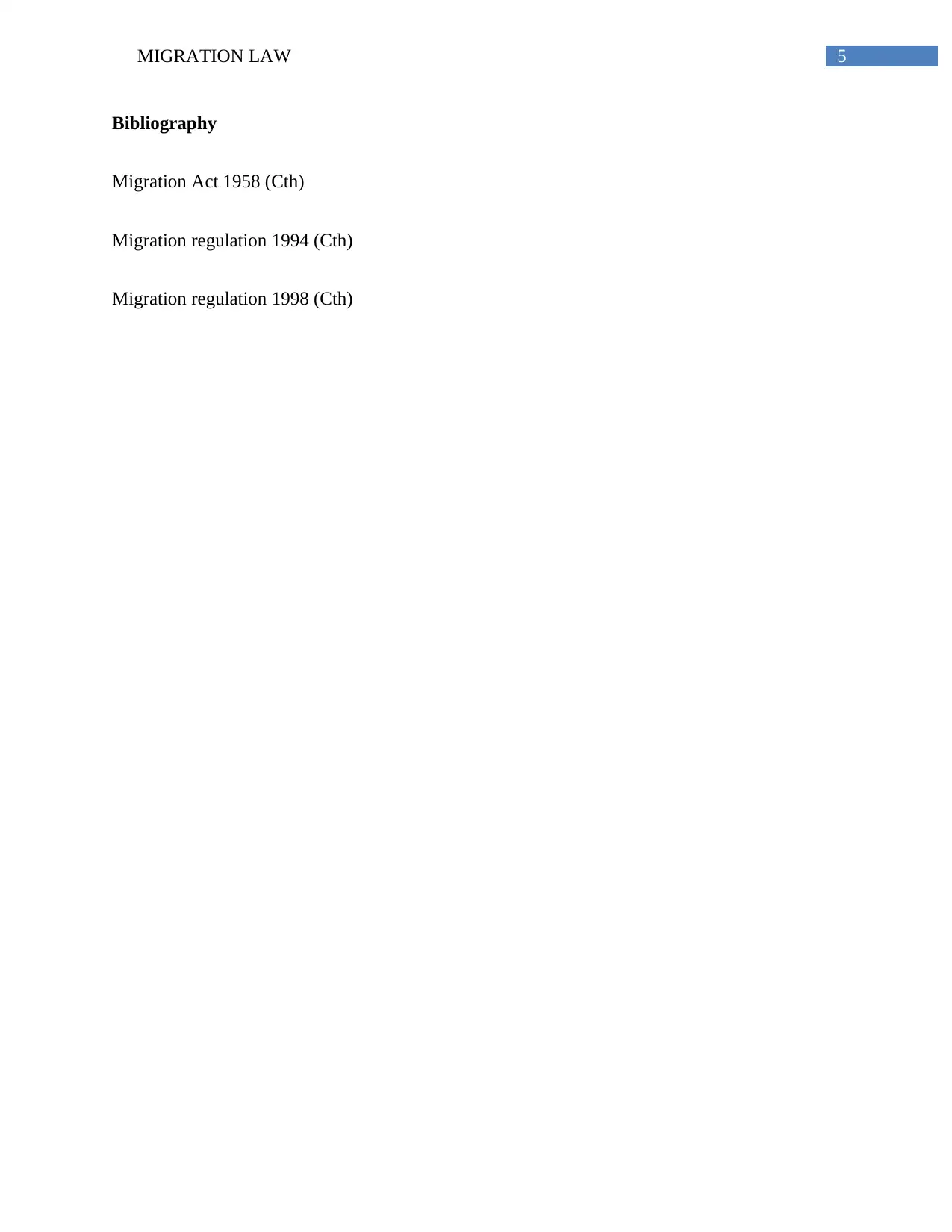
5MIGRATION LAW
Bibliography
Migration Act 1958 (Cth)
Migration regulation 1994 (Cth)
Migration regulation 1998 (Cth)
Bibliography
Migration Act 1958 (Cth)
Migration regulation 1994 (Cth)
Migration regulation 1998 (Cth)
⊘ This is a preview!⊘
Do you want full access?
Subscribe today to unlock all pages.

Trusted by 1+ million students worldwide
1 out of 6
Related Documents
Your All-in-One AI-Powered Toolkit for Academic Success.
+13062052269
info@desklib.com
Available 24*7 on WhatsApp / Email
![[object Object]](/_next/static/media/star-bottom.7253800d.svg)
Unlock your academic potential
Copyright © 2020–2026 A2Z Services. All Rights Reserved. Developed and managed by ZUCOL.




